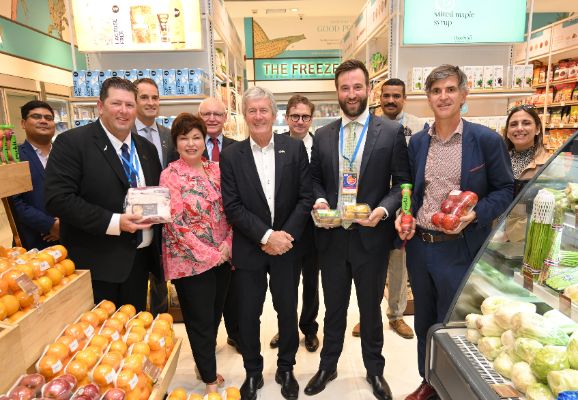Primary Sector Exporters Buoyed By Opportunities For A Closer India-NZ Relationship But Different Approach Necessary
Primary sector exporters recently returned from a visit to India are excited about the opportunities for a closer partnership between the two countries, however they are urging the New Zealand Government to adopt a more flexible and focused approach to trade.
New Zealand’s agriculture exporters and industry bodies, including representatives from the red meat, kiwifruit, apples & pears and dairy sectors, were part of an India New Zealand Business Council (INZBC) delegation which coincided with a visit from Trade Minister Damien O’Connor.
“India has come out of COVID-19 with growing confidence and strength, and its leaders have a clear focus on accelerating economic growth including through trade,” says INZBC chair Earl Rattray, who has dairy interests in India.
“India is on track to become the world’s third largest economy within the next decade. There is a modern economic miracle unfolding there, with an openness to explore mutually beneficial ways to strengthen trade relationships. This is a good time for New Zealand business to embrace India.”
Sirma Karapeeva, chief executive of the Meat Industry Association (MIA), said India has already demonstrated a willingness to approach trade agreements in a phased approachh.
“New Zealand needs to focus on creating sector-level solutions suitable for this market. It is also critical that New Zealand moves quickly to secure a place in the queue with India, but also to continue to build a deeper and broader relationship.
“This calls for a strategy and the primary sector stands ready to work with the government to co-design a NZ Inc. strategy for enhancing our bilateral economic partnership.”
Terry Meikle, chief executive of New Zealand Apples and Pears, said moving beyond a transactional relationship and demonstrating a real commitment to being a true and trusted partner with India is vital.
“It is important that we find opportunities to work together to share knowledge, build greater understanding between our two countries and find opportunities for mutual benefit.
“New Zealand Apples and Pears has a long history in the state of Himachal Pradesh, working with local growers to improve their livelihoods. We know from this experience that New Zealand and India have things we can learn from each other.
“Continued success with wider agricultural collaboration will require a well-designed strategy that draws on both government and industry strengths to set the direction of travel. This strategy must identify areas for ongoing co-operation through meaningful connection of our people.”
Michael Fox, head of global public affairs at ZESPRI, said New Zealand has a lot to offer India, and in return New Zealand exporters would benefit from improved access including tariff reductions to open up opportunities in India.
“India’s growth and potential are immense and there’s a clear willingness from the Indian government to explore opportunities which work for both sides and create a platform for a wider agreement. However, it’s not just New Zealand seeking to expand the relationship, and we have to be flexible, clear and committed in our approach if we are to realise our goals.
“Consistent and frequent ministerial level engagement alongside business will be critical in keeping momentum going, building on the constructive discussions between officials on both sides.
“Having Minister O’Connor travel to India, following the visit by Associate Agriculture Minister Meka Whaitri earlier this month, was really valuable and we’re looking forward to supporting the government with their continuing efforts to strengthen the relationships and build on the conversations we had during this visit.”
Geoff Allott, executive director of QualityNZ, which has been providing a range of premium New Zealand products to over 350 five-star hotels and premium retail outlets for 10 years in India, says that relationships and patience are the key to success.
“New Zealand producers and providers can’t expect to come into this market and succeed without investing time and resources to understand the opportunity. Both the public and private sector need to invest in India now to avoid missing the tidal wave that will be India in the coming years.”



 Raise Communications: NZ Careers Expo Kicks Off National Tour Amid Record Unemployment
Raise Communications: NZ Careers Expo Kicks Off National Tour Amid Record Unemployment Hugh Grant: How To Build Confidence In The Data You Collect
Hugh Grant: How To Build Confidence In The Data You Collect Tourism Industry Aotearoa: TRENZ 2026 Set To Rediscover Auckland As It Farewells Rotorua - The Birthplace Of Tourism
Tourism Industry Aotearoa: TRENZ 2026 Set To Rediscover Auckland As It Farewells Rotorua - The Birthplace Of Tourism NIWA: Students Representing New Zealand At The ‘Olympics Of Science Fairs’ Forging Pathway For International Recognition
NIWA: Students Representing New Zealand At The ‘Olympics Of Science Fairs’ Forging Pathway For International Recognition Coalition to End Big Dairy: Activists Protest NZ National Dairy Industry Awards Again
Coalition to End Big Dairy: Activists Protest NZ National Dairy Industry Awards Again Infoblox: Dancing With Scammers - The Telegram Tango Investigation
Infoblox: Dancing With Scammers - The Telegram Tango Investigation